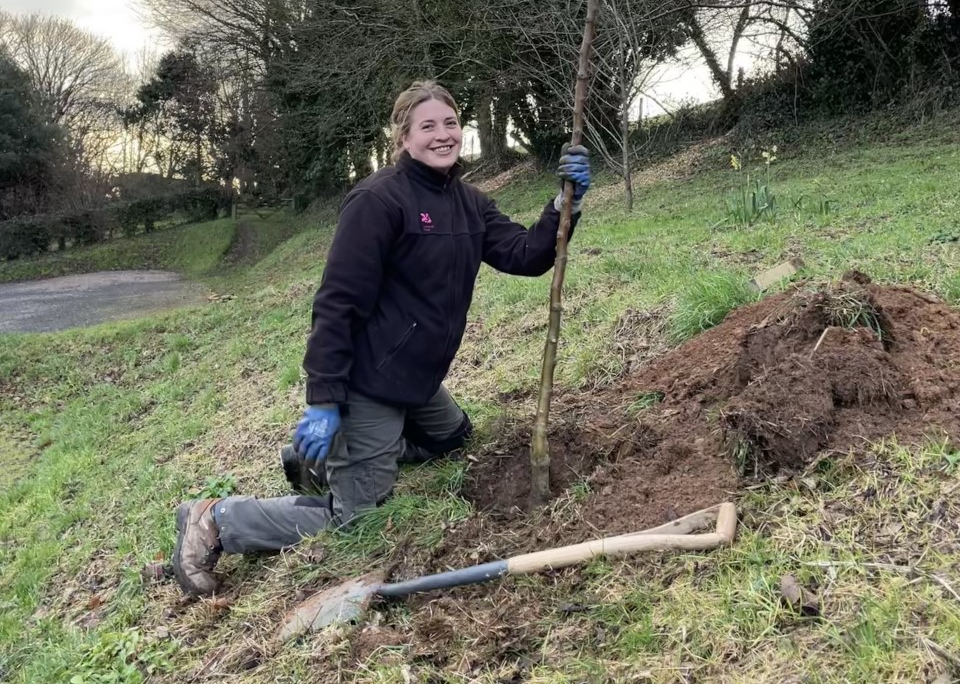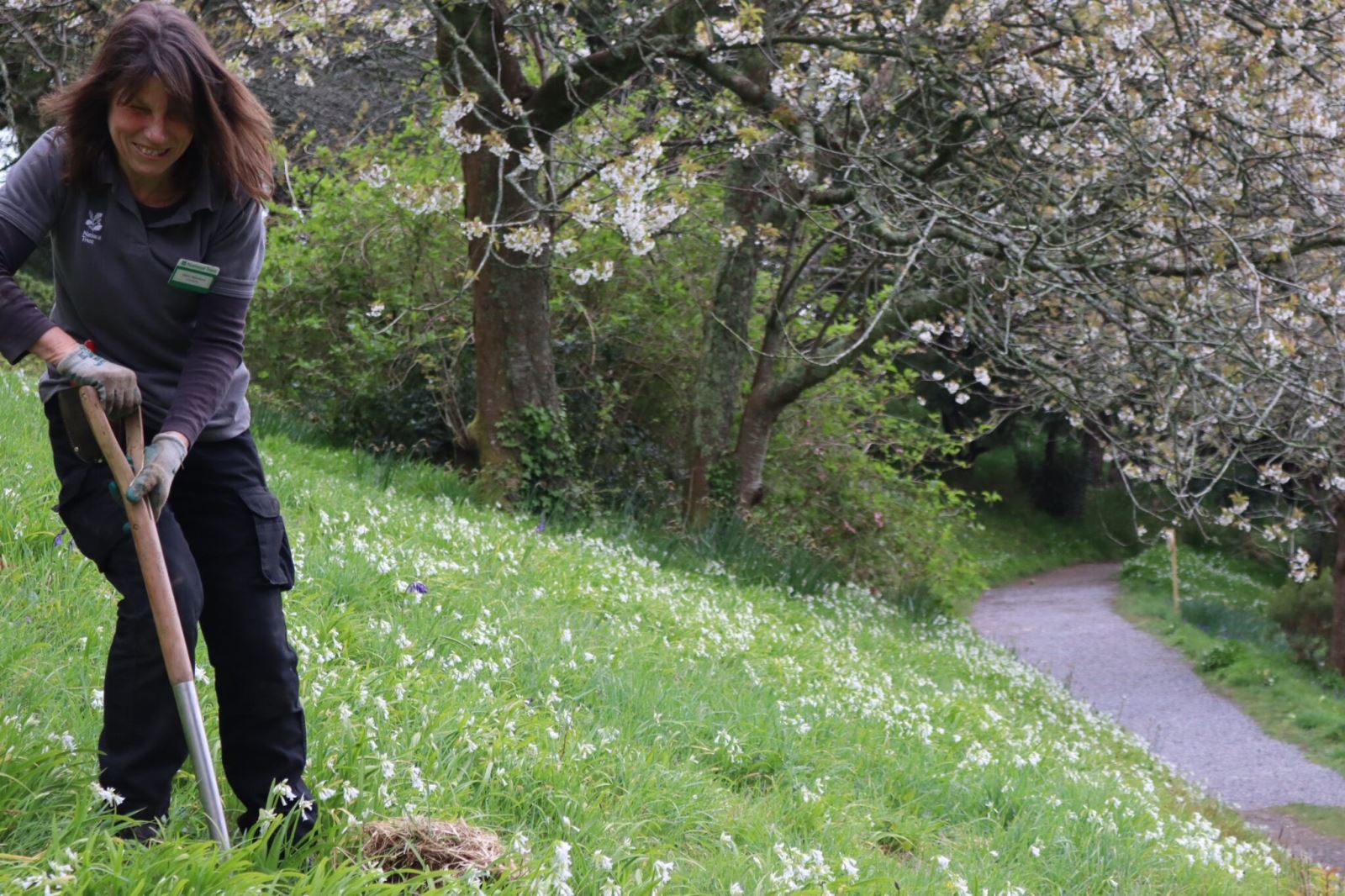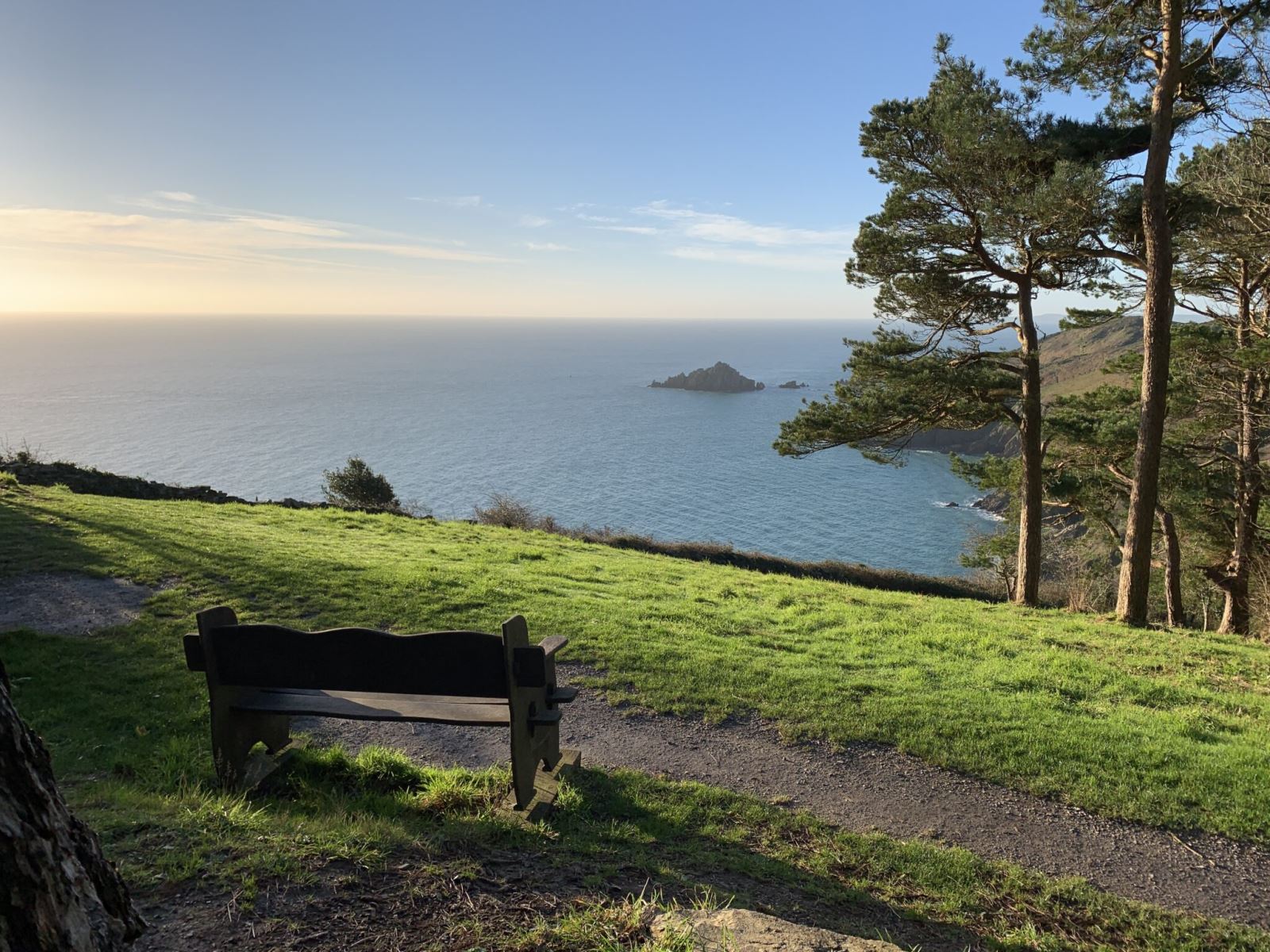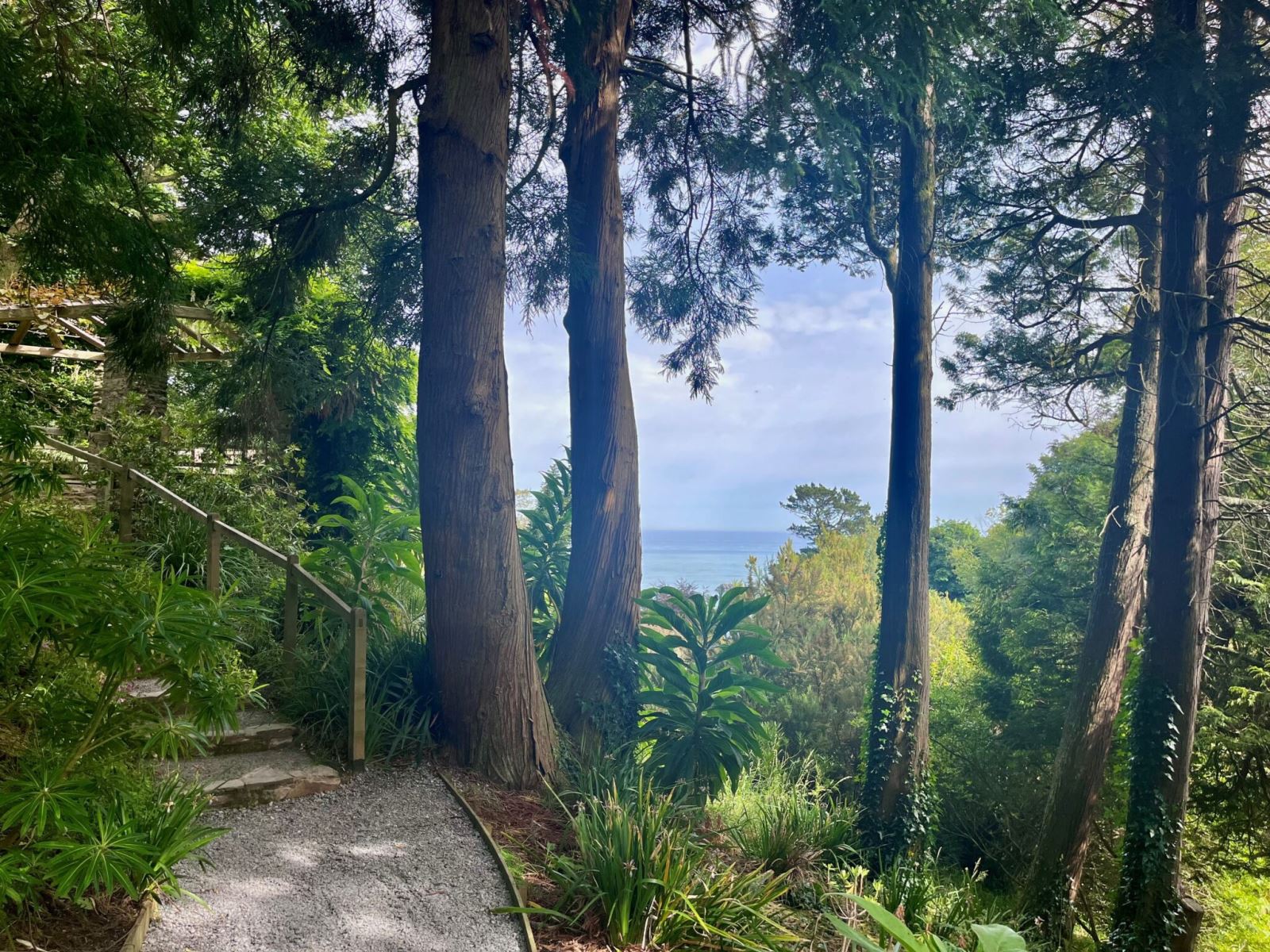.jpg)
Author
We’re continuing on our journey to discover some of the most unusual jobs around the English Riviera with English Riviera Days Out, and today we’re heading to Coleton Fishacre!
International Women’s Day, March 8, is a global day celebrating the social, economic, cultural, and political achievements of women. The day also marks a call to action for accelerating women’s equality. We’re shining the spotlight on two of the gardeners who look after the RHS accredited garden at Coleton Fishacre, Annie and Claire.
 Annie planting new apple trees in the old orchard, now the car park at Coleton Fishacre
Annie planting new apple trees in the old orchard, now the car park at Coleton Fishacre
How did you get into your role?
Claire: I was a doctor for 30 years and in my mid-50’s I made a positive decision to retire early. I wanted to continue working but not within the medical profession. Having been a keen amateur gardener for many years I decided to make my hobby my new career. I was very motivated to learn new skills and physically fit enough to work in horticulture.
I spent the next couple of years undergoing an apprenticeship and RHS Level 2 Diploma and then moved back to Devon. Four months later I started volunteering at Coleton Fishacre and Overbeck’s, worked 2 days a week at Fast Rabbit Farm Gardens near Dartmouth and started a Garden History course. My retraining and work experience confirmed my wish to garden within the heritage sector-hence my delight when a position came up at Coleton Fishacre and I was successful in my application.
Annie: After a career working as an ecologist for the Wildlife Trusts, I wanted to make a difference for wildlife and the environment on a local scale and inspire others to do the same at home. After starting out growing organic produce for a Community Supported Agriculture scheme, I got my break in ornamental gardening by working as an Assistant Gardener at Hidcote Manor Gardens in Gloucestershire. I moved down to Devon in 2019 to study sustainable growing at Schumacher College and after a period of growing native trees for a rewilding charity, began working as a gardener at Coleton Fishacre in 2021.
 Claire planting new cherry trees as part of the Queen’s Green Canopy Project in 2022.
Claire planting new cherry trees as part of the Queen’s Green Canopy Project in 2022.
What’s your daily routine as a gardener?
Annie: One of the great things about working as a gardener is that no two days are ever the same. Gardeners are an adaptable breed, with the seasons and weather requiring us to stay flexible to the needs of the garden, our volunteers and visitors.
On a typical day, I’d start by catching up with garden colleagues and discussing work tasks for the team and volunteers before getting outside as quickly as possible! We share a weekly and monthly garden task list that we talk through before heading out so that everyone knows their jobs for the day.
Depending on the time of year and weather, I could be pruning shrubs, mulching beds, sowing seeds, weeding, propagating plants or mowing lawns. The variety of tasks, camaraderie of the team and the need to stay in tune with the seasons makes the job immensely rewarding. I love having the opportunity to share such a beautiful place with our visitors, providing an opportunity to find peace in nature or inspiration for their own gardens.

What do you enjoy about working at Coleton Fishacre?
Claire: The fact that once again I now look forward to going to work. My colleagues are great to work with and such good fun, and we have a fantastic bunch of volunteers.
No two days are the same. The current garden development is exciting. I continue to learn new skills and develop my horticultural knowledge. The work keeps me physically fit and it’s great being outside. I enjoy chatting with the visitors-showing off the garden, helping them see as much as they are physically able to, educating them and learning from them.
What do you enjoy about working in a tourist area?
Annie: I’m very lucky to work as part of a wonderful team in a stunning location and feel so privileged that people choose to spend their free time with us. Meeting people from all over the world and hearing how they garden at home is a constant source of inspiration. I’m continually impressed by how knowledgeable our visitors are and love that they keep me on my toes and encourage me to keep furthering my horticultural knowledge.
It’s a real pleasure to work in a visitor attraction that provides serenity in nature and pleasure for so many people. To work as part of a team that helps make memories for all our visitors makes every day a privilege.
What do you find most interesting in your job?
Claire: The most interesting part of the job comes from working in a field of horticulture that is atypical a garden of relatively recent historical interest with its own micro-climate and rare and quirky selection of plants.

What’s the best thing about working at Coleton Fishacre?
Annie: Coleton Fishacre sits right on one of the most beautiful sections of coast in the UK and nestles into spectacular countryside. There’s an incredible collection of rare plants and a spirit of horticultural experimentation that allows the garden team to be creative and have fun! We’re passionate about sustainable gardening and wildlife and can try out new techniques and planting combinations that our visitors won’t have seen elsewhere. Being part of such a dynamic team means that I have endless enthusiasm for the work we’re doing and our higher purpose of conserving this special place – something that I’m able to share with our visitors and help make their time with us extra memorable.
Any funny stories from your experience as a gardener?
Claire: Funny story about job, although not 100% related to Coleton.
On my first day as a garden volunteer at Overbeck’s, the then Head Gardener, Cat, came to check that I was ok. She struggled to find me but ultimately did (I was busy weeding a bed, hidden under various shrubs). When she returned to the Gardeners’ Mess Room and saw my husband (a gardener in her team) her comment was ‘she does fold up small, doesn’t she?!’
What’s been your highlight?
Claire: The first time I visited Coleton Fishacre was in May 2014, just after I had retired. I absolutely loved it and when I saw my husband that evening, I told him I had found the garden I wanted to work in. I feel proud that I have managed to succeed in my dream of embarking on a new career-that my retraining and work experience have paid off to allow me, a lady of a certain age to spend my final working years in my favourite NT garden.
Annie: Since I began working at Coleton Fishacre in 2021, I have been redesigning Wellington’s Wall – a south facing, dry bed at the heart of the garden. With ever hotter summers and with climate change on all our minds, I have blended plants from the Mediterranean region with natives found along our beautiful coastline. The final design highlights the importance of our native plant heritage, whilst providing nectar for pollinators and beautiful plants for our visitors to enjoy.
Having the opportunity to explore the design process and have creative control of such an important project has been so rewarding and I’m very grateful to have been given the opportunity to hone my design skills. With the bed prepared over the winter and with many of the plants now waiting in the nursery ready to go, I’m excited to complete the new border and share it with all our visitors over the coming season.
Related

At the country home of the D’Oyly Carte family you can travel back in time to the Jazz Age. This most evocative of country homes was built in the Arts & Crafts style in the late 1920’s and is imbued with Art Deco elegance. A light, joyful atmosphere fills the rooms, and music plays, echoing the family’s Gilbert and Sullivan connections. You can get an insight into 1920s life ‘upstairs and downstairs’ from the glamorous Saloon to the airy servants’ rooms. In the RHS accredited garden viewpoints give enticing glimpses out to sea, and paths weave through glades past tranquil ponds, as tender plants from the Mediterranean, South Africa and New Zealand thrive in the moist and sheltered valley.
Comments
Comments are disabled for this post.







